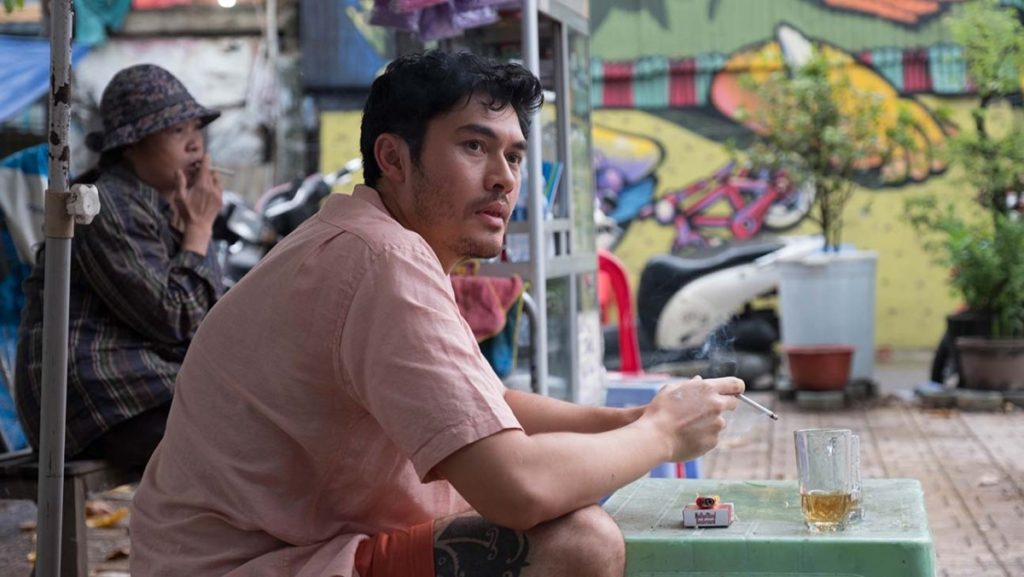Some motion picture experiences work so well as contemplative, moving stories, that in an instant you forget cravings you may have for the action blockbuster or stylised thrillers. If that’s your thing. As the film art form can transport you through time and space, so can it take your hand and walk you through a serene, somber meadow.
Truth be told, not many films can engage and penetrate so seamlessly and in such a tranquil manner as Hong Khaou‘s Monsoon. His second British feature, after 2014’s Lilting with Ben Whishaw, is a sedated, but powerful, human drama from the writer-director. Scattering the dual identities of a Vietnam that still recovers from those war-torn days as well as reviving itself somehow in the modern world. Traditions and innocence, though, seem to pay the price.
Proving his worthy leading man status outside of the mainstream cinema, Henry Golding plays Kit, a man venturing back to the country he was born in but has not stepped foot on Vietnamese soil for 30 years. Making the momentous journey to find a home for his parents’ ashes, the man hardly recognises the country – and vice versa.
Festival de Cannes: The Scent of Green Papaya (1993)
A stranger in a strange land, Kit wanders the hectic, horn-bibbing streets like a tourist. His re-connection is a faint one, the surroundings are partially unfamiliar and he has difficulty remembering a whole lot with his childhood friend. But the emotive blueprints are there, an abstract part of his identity float around him somewhere like bubbles popping into the atmosphere.
Kit admittedly declares he knows little Vietnamese, Khaou is content in allowing us to simply watch our protagonist look out onto the horizon. We watch Kit stroll the streets, exit the frame and reenter on a building’s second tier. Khaou wants us to pay attention to the Vietnamese architecture as well as the physical journey Kit embarks on.
Though not a focal point in its depiction of homosexual romance, Kit hooks up with a local man here and there. It is the bond he forms with an American, Lewis (Parker Sawyers), that holds much resonance and empathy. They tap through each other’s walls, sharing their differing parents, both somehow affected by the Vietnam war. Their companionship in all its challenging and tactile moments clearly feels like a tension release for both parties.
The Weird Experience of Watching ‘Last Christmas’
Monsoon delivers, but never dwells, on the tenderness of melancholy and the relief of awe. Kit witnessing even the smallest of cultural variances provide endearing snapshots of a far off world we could all perhaps relate to. Those beds above seats on train, or an old lady sitting opposite him, give Kit welcome hesitations and distractions from the absence he must fill from his own native history. And how very British of him to hand over gifts to his extended family of biscuits in a tin. Or share a story of how his mother admired the Queen as a reason to choose England as a permanent dwelling.
Like the film itself, both Saigon and Hanoi are shown to be beautifully rustic in their healing process. Kit and the world around him navigate from one quiet sequence to the next, omitting a subtle and potent aura. Benjamin Kračun’s camera lingers just as we would in that scenario. There are non-showy birds eye shots too – the opening one in particular shows a plethora of criss-crossing mopeds so entangled and beguiling it is as though we’re watching some eye-grabbing wildlife footage.
The imperfections of Kit – like the inability to organically smile with that crooked mouth – are terrifically captured by Henry Golding. The performance, so understated and absorbing, make his a character so relatable and yet so distance at the same time. Golding’s mannerisms and cautious body language actually give Kit such sincere life that you can almost feel his unrest.
Film Review: Da 5 Bloods (2020)
Monsoon drifts on by like an old poem left to bobble on a riverbed. Kit’s own rekindling of the cultural identity before him shine dimly like emotional amnesia. His memories may or may not be there somewhere. The next time you walk by the front door you used to slam shut as a kid decades ago, what sort of nostalgic pull will you feel?
Hong Khaou conveys much of this steadily-paced amble with little dialogue too. Kit’s solitude and reluctance to express himself suits this. And the film as a whole leaves spaces for us, the audience, to ponder. The lack of plot points and shifts in focus will isolate some watching this for sure. Monsoon can’t speak to everyone.
There is actually a noticeable absence of music too. This reviewer was a little jolted out of his comfort zone as the final track kicked in. Like we were being informed that this is your lot, folks. Still, there was a kind of disappointment that this particular journey was coming to an end. Khaou perhaps knew, even through the silence, I could hear the ambient excellence of Hammock – whose composition accompanied the also wistful Columbus a couple of years back.
Festival de Cannes 72 Countdown: Paris, Texas, 1984
Monsoon is a simple film about finding your place, wherever that may be, even if that search transcends any sort of closure. Made with a keen eye on our own fruitful existence, while looking back at those things that have changed. Khaou has a caring, graceful approach to story-telling, all the while refusing to hide any pain one might feel – physically or mentally.
With it’s heart on its sleeve, Monsoon might not be a film that leaves a heavy weight for many. But it certainly imprints a recognisable yearning and pensiveness. I’ll happily drift around my own thoughts for days now, even if the content of such carries a significant and reflective sadness. They need embracing too.
Monsoon is now available to stream on BFI Player

